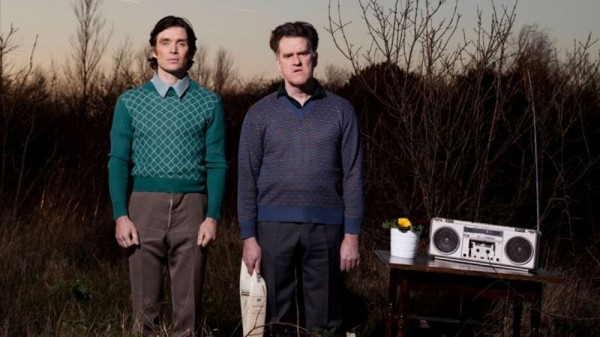While the audience might guess the setting of Enda Walsh’s Ballyturk to be a fictional village in Ireland sometime in the late ‘60s / early ‘70s, the programme specifies that it takes place in “No time. No place.” Very well.
Its characters are numbered rather than named. 1 (Cillian Murphy) and 2 (Mikel Murfi) spend their time jumping and dancing to ‘80s pop (there goes the ‘60s / ‘70s theory) around Jamie Vartan’s impressive set – a flat with no visible doors and too few chairs that’s instead populated by wardrobes and cupboards, some impossibly high.
The two men, be they brothers or lovers or friends, whirl through zany impressions of the Ballyturk populace, share dreams and fears, sometimes explode and sometimes collapse into emotional puddles. Then they’re joined by 3 (Stephen Rea), who might be their father or uncle or Death. He spouts some philosophy, gives them an ultimatum, and that’s it.
There’s no requirement for a play (or any art form) to make sense, or pander to its audience. Beckett is one of the best-known playwrights of the 20th century; David Lynch has made a career of baffling cinephiles; Kate Bush is packing in audiences in Hammersmith. All that’s required is an emotional impact, a raw response to the art on display.
Ballyturk, at heart, seems to be about mortality, and the fear of it. Whatever the scenario, its underlying current of fear comes across – sometimes nightmarishly so – amidst all the clowning.
Despite the lack of clear narrative or (that dreaded term) character arcs, Cillian Murphy and Mikel Murfi give 100% of themselves in their roles, somehow injecting fervour and pathos and humour into what are essentially non-entities. Murphy cries himself hoarse, at one point dripping blood. Murfi shakes with guilt.
Yet for all this on-stage emotion, Ballyturk leaves no mark. Its zany comedy is irritating at best and eye-rolling at worst (except for a laugh-out-loud set-piece involving a Jenga pile of biscuits with tea). When it aims for profundity, the long monologues, mainly left to Stephen Rea, only come across as recitations of existential angst, as opposed to genuinely-felt expressions of humanity, and as such simply grate.
Of course there’ll be those who evangelically praise this show, and decry those who dislike it as “just not getting it”. Easy to do when nobody in the whole auditorium could tell you what was going on up there.
It’s also extremely difficult to dismiss a script which so often throws out beautiful turns of phrase, its comedy working best when based on language rather than antics. It’s even harder to dismiss the characters when there are no less than three fully-committed performers on that stage, thrashing themselves to apparently no avail.
Ballyturk will either be taken as an existential piece of genius, an Irish Under Milk Wood via Beckett and The Mighty Boosh, or a 90-minute long Mighty Boosh episode with philosophical aspirations, whose desperation to astonish at every second makes its running time feel twice as long.
Performed on Tuesday 16 September 2014 at the Lyttelton Theatre.
> Buy tickets on the official website.
What did you think of Ballyturk? Let us know below…

